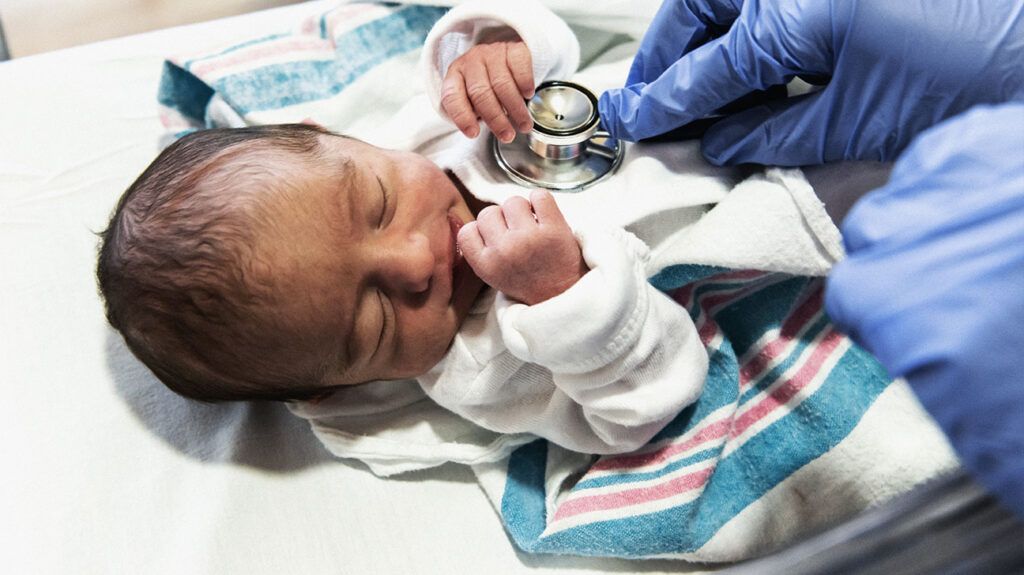Anemia in babies may manifest as pale skin, irritability, and a fast heart rate. Sometimes, mild to moderate anemia may not produce symptoms, but severe anemia can have very serious consequences.
A
Iron deficiency is the most common cause, but in some children, infections and other conditions may underlie anemia. Treatment of iron deficiency anemia can involve iron supplements in the form of drops, but once babies are older, it would entail eating iron-rich foods.
Keep reading to learn more about anemia in babies, including its symptoms, causes, treatment, outlook, prevention, and when to call a doctor.

Symptoms depend on the severity and whether the anemia is acute — short-term — or chronic — long-term.
Symptoms can include:
- pale skin
- tiredness
- swollen or sore tongue
- fussiness or irritability
- a fast heartbeat
- wanting to eat odd things, known as pica, such as dirt or ice
A
- a yellow tinge to the skin and dark urine, in some children
- low oxygen
- heart failure
- hypovolemic shock
- seizures
Learn more about anemia.
If a baby is not feeding well or has symptoms of anemia, a caregiver should call a doctor. Even when babies do not show symptoms, once they are 12 months old, they should undergo screening for iron-deficiency anemia.
Always follow the recommended schedule of well visits to ensure appropriate screenings are done for children.
Iron deficiency is the most common cause. Typically, full-term newborns have iron stores they receive during the last 3 months of pregnancy. That said, a baby born to a person with iron deficiency may not have enough iron.
Also, babies born early may have low iron stores.
Once babies reach 4–6 months of age, the iron stores they accumulate during pregnancy are low, so they must get iron from their diet. Breastmilk does not contain much iron, so babies who get their nutrition solely from this source may not have enough.
- infections
- blood disorders that mainly affect red blood cells
- other chronic diseases
A
The supplement may be in the form of drops in early infancy. A parent needs to administer the supplement in the form and exact dosage the doctor recommends.
When babies are old enough to have solid food, they should eat an iron-rich diet. Such foods include:
- leafy greens in the cabbage family, such as broccoli and collard greens
- meats, such as beef and lamb
- fish
- poultry, such as turkey and chicken
- iron-enriched cereals, pasta, and bread
- legumes, which are beans and peas
- yeast-leavened whole wheat bread
Learn more about iron-rich foods.
Anemia in infants may hinder growth, cognitive development, and heart function, reports a
It is worth noting that even when iron deficiency is the main cause, a child may have multiple causes that can contribute to it, according to the review. Since some of these can be life threatening, diagnosing all underlying causes is important to maximizing the likelihood of the best possible outlook.
Learn more about the dangers of anemia.
Prevention of iron deficiency in babies includes the following.
- Starting at 4 months, babies who are partially breastfed or solely breastfed should take a daily iron supplement. Because infant formula contains iron, formula-fed babies do not need an iron supplement.
- Once babies are ready for solid foods, they should eat iron-rich foods.
- Caregivers should not give babies less than 12 months old cow’s milk.
Anemia in babies is most commonly due to an iron deficiency, although other conditions can cause it. Symptoms may include pale skin, irritability, and a fast heart rate.
However, babies may not always manifest symptoms in mild to moderate cases, so they should undergo screening for iron deficiency when they reach 12 months of age.
Treatment may include iron supplement drops in early infancy and an iron-rich diet once a baby is old enough to eat solid food.
Certain measures can help prevent iron deficiency in babies, such as avoiding cow’s milk until they are 12 months old.
A parent should not give a baby an iron supplement unless a doctor directs them to do so. When a baby shows any signs of anemia, it is best to get medical attention.
